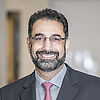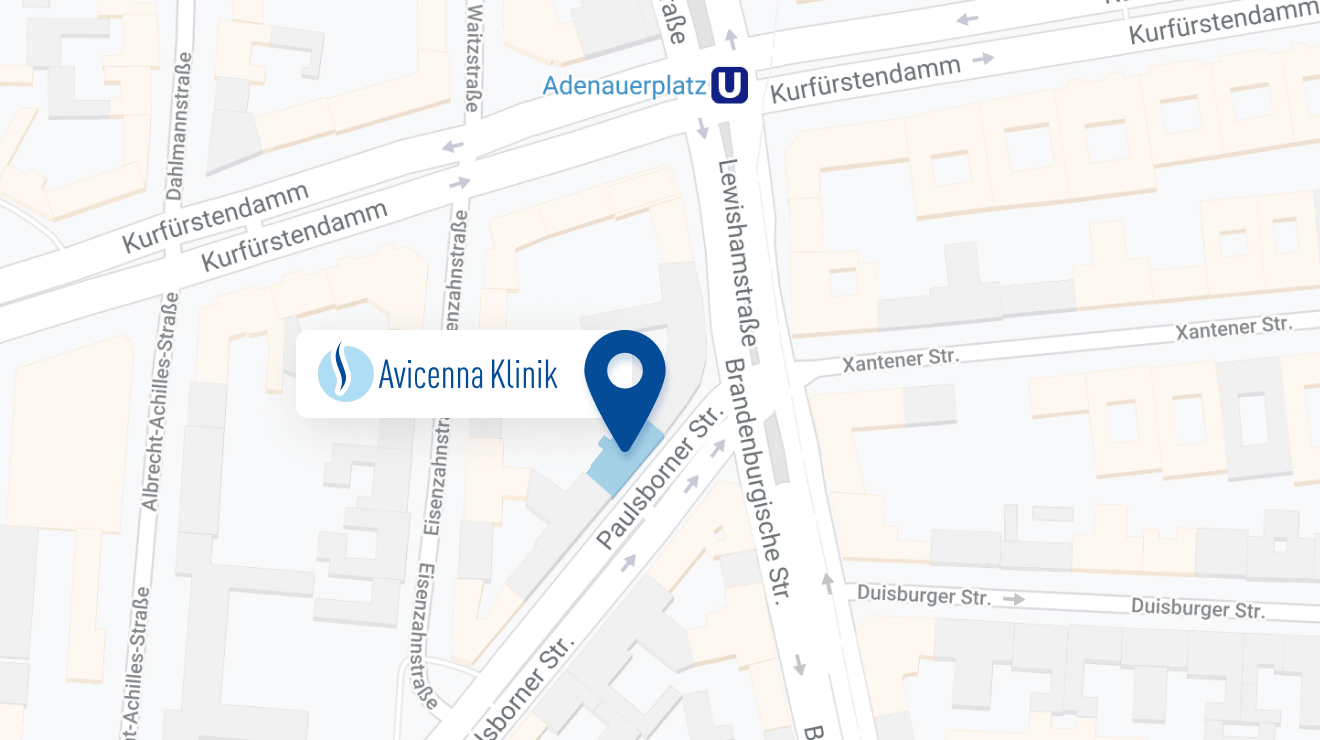What is a denervation?
For more than 200 years, the effect of heat or cold on irritated nerves has been known in the medical literature. The term denervation refers to the complete or partial interruption of the transmission of pain impulses. The performance of this modern minimally invasive procedure is possible not only with heat (thermo-denervation at about 80 degrees heat), but also with cold (cryo-denervation at about minus 60 degrees Celsius). This method relieves the discomfort, but does not eliminate the actual cause (arthrosis or spinal deformity).
Back pain is caused in the majority of cases by arthrosis of the vertebral joints. Vertebral joint arthrosis is the result of wear and tear on the cartilaginous tissue in the joint and in the joint capsule around the joint. Calcifications press on the tiniest nerves. Pain passes from the nerve branches to the large nerves in the spinal cord and from there to the brain. To break this pain-chain, denervation (also known as neurotomy, neurolysis, or sclerotherapy) can turn off the small nerve fibers, and deactivate them. Minimally invasive denervation is an effective form of therapy. It is low-risk for the patient and less stressful. Neither muscles, or bones nor ligaments are damaged by this procedure. The function and mobility of the joints are completely preserved. Because when working outside the spinal canal, the risks are extremely low.
When does a doctor recommend minimally invasive denervation?
We recommend denervation - deactivation of irritated nerves with cold or heat - whenever conservative measures to relieve back pain do not help. The therapy is recommended for
- back pain due to vertebral joint arthrosis (facet arthrosis) in the lumbar, thoracic or cervical spine;
- pain in the area of the sacro-iliac joint (SIJ syndrome);
- other indications may be back pain after disc surgery (post-nucleotomy syndrome), joint deformities, malpositioning of the small vertebral joints, pseudoradicular complaints (with local or radiating pain);
- pain due to ankylosing spondylitis;
- we also recommend this method in our clinic if the general health condition of the patient does not allow another procedure.
If there is another clear cause, such as a disc herniation, severe spinal canal stenosis, a cyst or a fracture, then this cause is treated.
Operation course - under computed tomographic X-ray control
Before general anesthesia we disinfect the painful area of your body (for example lumbar spine) with an antiseptic solution. While lying on the operating table, we use an X-ray or CT scan to gently guide a 2 mm thin cannula to the affected nerve. In order to know that we are exactly where we want to go, the responsible nerve fibers are first stimulated (neurostimulation). If the results are positive, we introduce a laser fiber into the cannula and generate local heat of about 80 degrees. This will allow us to deactivate or turn off these nerve fibers that transmit pain. This procedure takes approx. 1 hour.
The denervation can also be achieved with cold (cryo-denervation). As a rule, the procedure is stationary; the stay is about 1 week. Before the procedure, infiltration test could be performed, but they are only relatively helpful.
Right after denervation
The day after the intervertebral disc implantations is the day in which you will be mobilized with a specific physiotherapeutic program. At the same time bending, twisting and sitting must be avoided. After the procedure, our competent team will welcome you in the recovery room for 1-2 hours where, as usual, your heart and lung functions are going to be monitored. Well-trained nurses won´t leave you alone. You will then receive physiotherapy and pain therapy.
The next days after the operation
The day after the Denervation is the day in which you will be mobilized with a specific physiotherapeutic program. At the same time bending and twisting must be avoided. You will feel relief already on the first day after the operation. The pain associated with the procedure is treated with pain therapy and cooling packs. If you feel noticeable pain relief a week or two weeks after surgery at the latest, do not worry, you will feel more relaxed through the pain relief. This in turn leads to more flexibility and better blood circulation. In this phase, you should also start with targeted physiotherapy to strengthen the affected facet joints.
Keep in mind: If similar pain occurs again, the procedure can easily be repeated). It is obvious that after the operation, you should not in any case to lift or drag heavy objects. After 2-3 weeks, you can drive again and exercise 3-4 weeks later. From a medical point of view, you are considered unable to work (sick leave) for about one month.
The benefits of denervation
Denervation has a temporary effect. In general, the analgesic effect lasts for about 2 years and makes further medication unnecessary. The chances of success are 75 to 80 percent. With these significant pain regressions, patients can finally proceed and exercise their physiotherapeutic program. While the small nerves begin to regenerate after a few years, until then the muscles are able to take on the load of the vertebrae, which means that it is not necessary to renew the denervation. The procedure is minimally invasive: there is no destruction (damage, destruction) of bones, tendons or muscles. Complications are very rare.
The Avicenna Clinic in Berlin is always willing to help you
Since the year 2001, the Avicenna Clinic is based in Berlin. Our doctors have at least 25 years of international experience in their respective fields (neurosurgery, spinal surgery, anesthesia, and orthopedics).
If you have severe back pain, a herniated disc or a suspected herniation, please contact us using the following information:


